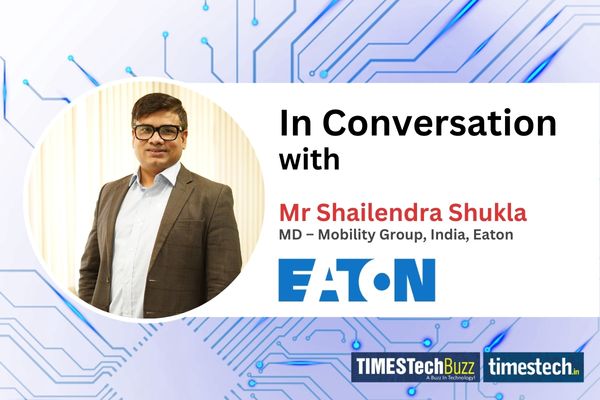Eaton is spearheading sustainable mobility solutions in India with innovative products and a commitment to reducing carbon footprints. Through collaborations with EV manufacturers, government agencies, and advancing hydrogen fuel cell technology, Eaton aims to revolutionize the transportation sector, achieving ambitious ESG goals and carbon neutrality by 2030.
Read the full interview here:
TimesTech: How is Eaton promoting sustainable mobility solutions in India, and what efforts are being made to contribute to cleaner transportation systems?
Mr Shailendra: Eaton provides a portfolio of innovative products and alternate fuel solutions with a strong focus on reducing carbon footprint and a commitment to creating sustainable solutions.
We also continue to push forward in our journey to pursue our bold environmental, social, and governance (ESG) goals, and as a group, we have goals to be carbon neutral by 2030. We are on course to reduce Scope 1 (Direct) and Scope 2 (Indirect – Energy) greenhouse gas emissions by 50% & Scope 3 (Indirect – Purchased Materials & Travel) emissions by 15% by 2030.
The vehicle industry is rapidly transitioning from traditional internal combustion engines (ICE) to electric mobility and alternative energy sources. Amid this transformative landscape, Eaton, a global leader in power management solutions, is pivotal in driving the vehicle industry’s energy transition. Leveraging our expertise in power electronics, energy storage, and advanced vehicle technologies, we provide innovative solutions to support sustainable transportation.
TimesTech: What are your insights on the current market dynamics, technological advancements, and regulatory developments in India’s electric vehicle sector, and how is Eaton adapting to stay competitive?
Mr Shailendra: The global and domestic vehicle industry has undergone a tremendous transformation in recent years, driven by the urgent need to address climate change and reduce greenhouse gas emissions. As the need to achieve ambitious sustainability goals rises, the focus has shifted towards adopting cleaner and more efficient energy sources in the transportation sector.
The vehicle industry is rapidly transitioning from traditional internal combustion engines (ICE) to electric mobility and alternative energy sources. Electric vehicles (EVs) have become a focal point, with technological advancements and supportive policies encouraging their widespread adoption. Despite the growing adoption of EVs, internal combustion engines continue to play a pivotal role in this era of automotive transformation, contributing actively rather than passively. To meet the emission standards, ICE will evolve toward high efficiency and engine improvements with advances in combustion technologies, fixed-point operation, system simplification, and cost reduction. The larger part of the transport sector will be powered by ICEs for some time to come, especially for commercial transport, and alternatives will begin to gain importance as we move ahead.
Furthermore, the advancement of hydrogen fuel cell technology has the potential to revolutionize long-haul transportation, making it more sustainable and environmentally friendly. The trucking and shipping sectors are particularly poised to benefit from hydrogen-powered solutions because they provide long-range capabilities and quick refueling times. As hydrogen production methods become more sustainable, there will be a significant rise in the adoption of fuel cell vehicles across both the commercial and personal transport sectors.
TimesTech: Can you elaborate on Eaton’s collaborations with EV manufacturers, utilities, government agencies, and other stakeholders and how these partnerships are advancing sustainable mobility solutions?
Mr Shailendra: Eaton is partnering with key EV OEMs in India and globally to roll out state-of-the-art solutions in the areas of power connections, power distribution, and power transmissions. Eaton’s patented product, Breaktor, is being highly accepted by EV manufacturers.
We also collaborate with government bodies and various stakeholders to develop innovative technologies that will significantly contribute to global sustainability efforts.
TimesTech: What initiatives is Eaton undertaking to develop EV charging infrastructure in India, and are there any innovative solutions or partnerships driving this effort?
Mr Shailendra: At our electrical facility at Pondicherry, we have begun producing electric vehicle chargers of 30 kW and 60 kW for passenger vehicles. The products are still in the prototype stage, and their technical feasibility is being tested at the Eaton India Innovation Center (EIIC) in Pune. We expect to launch the product by the end of this year. We also plan to make EV chargers of 120 kW and 240 kW for buses and trucks. Eaton has its digital transformation strategy and energy transition in place, which has helped us stay ahead of the curve.
TimesTech: How does Eaton cultivate leadership within its Mobility Group in India to drive innovation and sustainable growth, and are there any specific programs or approaches that have proven effective in talent development?
Mr Shailendra: Innovation at EIIC is guided and inspired by Megatrends—digitalization, electrification, energy transition, and sustainability. These trends illuminate our path as we innovate and create solutions for a rapidly evolving world.
Our Innovation Center is where ideas take shape and play a pivotal role. It serves as a hub for product design life cycle management—from research and technology exploration to product development. Equipped with multi-domain lab facilities, product verification and validation testing, and characterization labs, it fuels our drive for excellence.
AI at Eaton focuses on maximizing value across the board. Our AI initiatives at Eaton are purposeful. We leverage artificial intelligence to enhance our products, optimize design and manufacturing processes, and streamline company operations. By extracting maximum value from AI, we stay at the forefront of technological advancements.
Operating for Growth is our new framework that enables teams to focus on what they can control—manufacturing, safety, quality, cost efficiency, and talent development at the plant level. Responsibility for core operations lies with the teams who possess specialized knowledge and expertise.
Eaton India nurtures leadership within its Mobility Group through targeted talent development programs. One such program emphasizes digital technologies—an essential driver of innovation and growth. Our substantial investments in digital platforms and customer experience underscore our commitment to staying ahead.


















